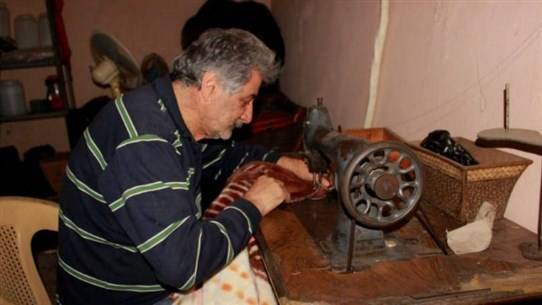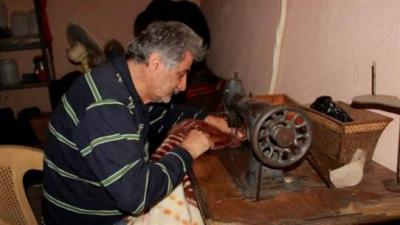Teacher Ali Sabah does not rely much on the official electricity supply from the Electricité du Liban, known as "state electricity." He continues to use a charcoal iron, remaining largely unaffected by the electricity outage crisis. His old iron, which dates back to the 1950s, helps him continue his work in sewing and ironing, unlike his colleagues who have opted for subscriptions to reduce their bills.
In the old Saray neighborhood, one of the oldest heritage areas in Nabatieh, Ali Sabah runs his ironing shop, where he continues to work in his traditional craft. He uses an old "Boud'asa" sewing machine to repair the piled-up clothes in front of him, as sewing has surged due to the crisis, leading to an increased demand for repairs. What is striking about his shop is that everything is old, from the sewing machine to the iron and the rest of the tools.
In a corner of the shop, Ali keeps his ironing tools, placing his antique iron next to them. Despite having a modern electric iron, he prefers using the charcoal iron for cost-saving reasons. He has never discarded his old tools or upgraded them, as he realized early on that the era of charcoal ironing would return. "Indeed, we have reached a time of total power cuts, and relying on commercial generators is very expensive, so many have turned to my shop for ironing their clothes because it's cheaper," he says.
For hours, he works in his modest shop, holding the iron, filling it with charcoal, and proceeding to iron the clothes. This iron has been in his shop since the 1980s, when he started this profession. Since then, he has relied on it, never discarding it as others have done, nor has he turned it into a mere antiquity; he keeps it in service, believing that heritage does not die.
Uncle Ali has never retired from his work, nor have his feet tired from the "Boud'asa" machine. On the contrary, he continues to mend torn clothes and repair everything that comes to his shop. He is consistent in sewing men's suits, mostly serving clients from the older generation who enjoy wearing "suits." He is the only one in Nabatieh practicing the profession of a tailor alongside repairs, and he also maintains his tools that require great precision and focus. "Mistakes here are not allowed," he states, adding that a single wrong stitch can take you back to square one.
He has not been much affected by the crisis; on the contrary, it has been a good omen for him, revitalizing his traditional profession. He continues despite no one from the current generation having learned it because it is labor-intensive and requires precision and patience. He may be the only one who still uses old tools, and perhaps also the only one who has defied the harsh electricity bills. "I sew and iron clothes, and the demand for my work is high. People come to me to get their clothes done, plus sewing and patching have become exorbitant due to the dollar," but Uncle Ali's prices remain affordable.




